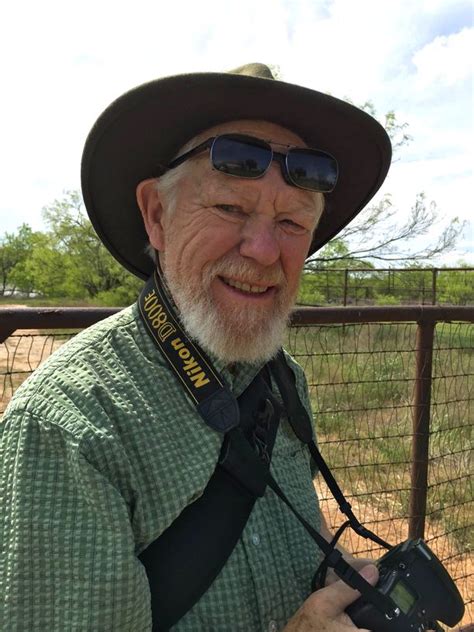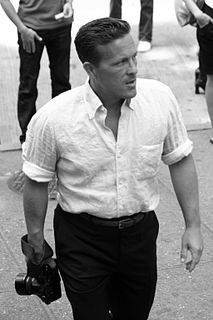A Quote by Frank Gohlke
The documentary style is an incredibly flexible and useful one. It's a wonderful tool for establishing the credibility of the version of things that's in the photograph - a kind of rhetorical device or rhetorical strategy. It's always felt very natural to me, because I want a person to end up thinking about the world, and to think about it in a way that is transformed by the experience of art.
Related Quotes
In any piece of rhetorical discourse, one rhetorical term overcomes another rhetorical term only by being nearer to the term which stands ultimate. There is some ground for calling a rhetorical education necessarily aristocratic education in that the rhetorician has to deal with an aristocracy of notions.
Everybody's version of style is totally different and that's what I think keeps me going out on the street everyday is going out and kind of seeing the variations and what things maybe I'd never seen quite that way that I find very curious and how people will be able to communicate their own persona through their clothing, their posture, the way they wear their hair. I think all those elements end up becoming very interesting because I don't think I'm really particularly a people person. So for me I think it's interesting to kind of be able to read people in that way.
A lot of people seem to think that art or photography is about the way things look, or the surface of things. That's not what it's about for me. It's really about relationships and feelings...it's really hard for me to do commercial work because people kind of want me to do a Nan Goldin. They don't understand that it's not about a style or a look or a setup. It's about emotional obsession and empathy.
Irony is about contradictions that do not resolve into larger wholes, even dialectically, about the tension of holding incompatible things together because both or all are necessary and true. Irony is about humour an serious play. It is also a rhetorical strategy and a political method, one I would like to see more honoured within socialist-feminism.
I make films that are very personal, and I always have. It's kind of the only thing that I think I have to offer as a filmmaker: the intimacy I've had with experience in a particular world, so the film comes from things I've seen and things I've felt. It gets transformed by the process. I don't think I'd ever start making a film until I had both the intimacy with the subject and the distance to make it live in a certain way.
I think, for me specifically when it comes to music, I don't think that I need any persuading to think about it. It's always kind of in the back of your mind and - but I think it's part of who I am and always will be, I mean, in a very cellular way. When you grow up doing, you know, one thing, I think you get to this place where you want to try new things. And I do think that we live in the type of world where people get comfortable with you in one way, and so seeing you in a different way, it takes some time.
I'm that way, goofy as it sounds. Sometimes I don't want things to happen-I'm talking about good things, even wonderful things-because once they happen, I can't look forward to them anymore. But there's an upside, too. Once a wonderful thing is over, I'm not all that sad because then I can start thinking about it, reliving and reliving it in the virtual world in my head.
The photographer Ruth Bernhard used to tell me that this is like asking somebody how they evolved their signature. It is not something I've ever worked on consciously. I think style is just the end result of personal experience. It would be problematic for me to photograph in another style. I'm drawn to places and subject matter that have personal connections for me and I photograph in a way that seems right. Where does it all come from, who knows?
What you have felt and thought will by itself invent a new style, so that when people talk about style they are always a little astonished at the newness of it, because they think that it is only style that they are talking about, when what they are talking about is the attempt to express a new idea with such force that it will have the originality of the thought.It is an awfully lonesome business, and, as you know, I never wanted you to go into it, but if you are going into it at all, I want you to go into it knowing the sort of things that took me years to learn.
The pope [Francis] takes his vocabulary from his pastoral experience, not from the rhetorical tool kit of liberation theology, with its Marxist yammering about "center" and "periphery." The "peripheries," for Francis, are all those who have fallen through the cracks of late-modernity and post-modernity - in his native Argentina, because of colossal corruption, political and financial.
I'm an anxious person in general, but something about being pregnant and awaiting the release of my first book, The Monsters Of Templeton, made me into an insane anxious person. I didn't sleep at night. I ended up sleeping all day. In a strange way I felt like the world was going to end. I found myself so deeply depressed at times that I started to read about happiness, and that took me into books about idealism and utopianism. Reading books about people who tried to build utopian societies of different kinds gave me a kind of lift.
When you say documentary, you have to have a sophisticated ear to receive that word. It should be documentary style, because documentary is police photography of a scene and a murder ... that's a real document. You see, art is really useless, and a document has use. And therefore, art is never a document, but it can adopt that style. I do it. I'm called a documentary photographer. But that presupposes a quite subtle knowledge of this distinction.

































